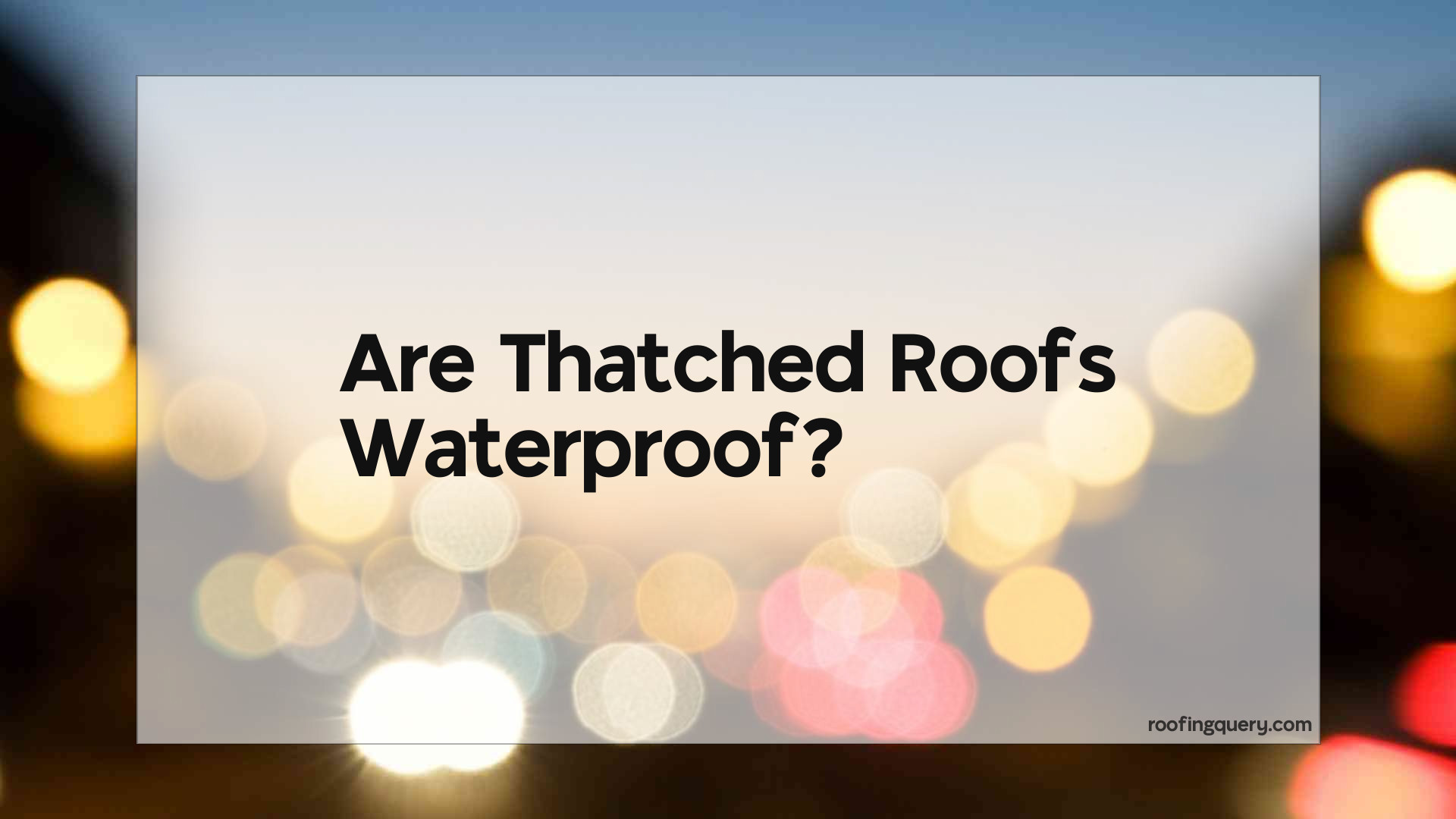No, thatched roofs are not waterproof.
A thatched roof is traditionally made from straw, but can also be made from other materials such as reeds, rushes, or heather. The straw or other material is then layered in a way that allows rainwater to run off of the roof without soaking into the thatch.
There are many benefits to having a thatched roof. They are environmentally friendly, as the materials used are often renewable. They are also very good at insulating a home, as the thatch can be up to a foot thick in some cases.
However, one of the most common questions about thatched roofs is whether or not they are waterproof. The answer is yes, thatched roofs are waterproof. The thatch is layered in such a way that water runs off of it, rather than soaking in.
There are also a few things that can be done to help extend the life of a thatched roof and keep it waterproof. For example, applying a coating of waterproofing material to the thatch can help. Additionally, making sure the roof is properly ventilated can also help to prevent water damage.
What Are Thatched Roofs Made Of?
A thatched roof is traditionally made of straw, but can also be made of reeds, sedge, or water reed.
A thatched roof is a traditional type of roof that has been used for centuries. They are made from a variety of materials including straw, reeds, sedge, and heather. Thatching is a craft that is often passed down from generation to generation.
There are many benefits to having a thatched roof. They are excellent at insulating homes and keeping them cool in the summer and warm in the winter. They are also very durable and can last for up to 50 years with proper maintenance.
Despite the many benefits, thatched roofs do have some drawbacks. They can be expensive to install and require more maintenance than other types of roofs. They are also not suitable for all climates and can be damaged by high winds or heavy rain.
If you are considering a thatched roof for your home, it is important to do your research and talk to a professional before making a final decision.
Are Thatched Roofs Waterproof?
No, thatched roofs are not waterproof.
When it comes to roofs, there
Are a lot of different materials that can be used. One of the more unique options is a thatched roof. Thatched roofs have been around for centuries and are still used in some parts of the world today. But are they waterproof?
Here’s a look at how thatched roofs are made and whether or not they can keep your home dry.
How Thatched Roofs Are Made
Traditionally, thatched roofs are made out of straw or reeds. The materials are gathered and then layered on top of the roof. The straw or reeds are then secured with wire or rope.
Over time, the thatch will compress and form a tight seal. This helps to keep water out and prevents leaks.
Are Thatched Roofs Waterproof?
Thatched roofs are not 100% waterproof. However, they are very good at keeping most of the water out. The thatch will absorb some of the water, but it will eventually drain out.
In heavy rains, you may see some water seeping through the thatch. However, this is usually just a small amount. The thatch will also dry out quickly in the sun.
One of the benefits of a thatched roof is that it’s self-cleaning. The thatch will trap leaves and other debris. This debris will eventually decompose and add nutrients to the thatch.
Are Thatched Roofs Fireproof?
Another common question about thatched roofs is whether or not they’re fireproof. The answer to this question is a bit more complicated.
The thatch itself is not necessarily fireproof. However, the thatch is usually soaked in a fire-retardant solution. This solution will help to prevent the thatch from catching fire.
The thatch is also layered. This means that if one layer catches fire, the other layers will help to extinguish the flames.
Are Thatched Roofs Expensive?
Thatched roofs can be more expensive than other types of roofs. The materials and labor required to install a thatched roof are higher than other options.
However, thatched roofs can last for centuries with proper care. This means that, in the long run, they may not be any more expensive than other roofing options.
A thatched roof is a unique and interesting option for your home. If you’re looking for something different, a thatched roof may be the right choice for you. Just keep in mind that they’re not 100% waterproof and they may be more expensive than other roofing options.
How Long Do Thatched Roofs Last?
In the UK, a thatched roof can last up to 60 years.
Thatched roofs are a traditional type of roofing that has been used for centuries. Although thatched roofs have been replaced by more modern materials in many parts of the world, they are still commonly used in rural areas. Thatched roofs are made from a variety of materials, including straw, reeds, and grass.
The lifespan of a thatched roof depends on the materials used and the climate. In general, thatched roofs last between 20 and 50 years. However, in some cases, thatched roofs have been known to last for centuries.
There are several factors that affect the lifespan of a thatched roof. The first is the type of material used. Straw is the most common material used for thatched roofs, and it has a lifespan of 20 to 30 years. Reed and grass roofs have a slightly longer lifespan of 30 to 50 years.
The second factor that affects the lifespan of a thatched roof is the climate. Thatched roofs are more common in climates with moderate temperatures and rainfall. In hot and dry climates, thatched roofs can last for centuries. However, in cold and wet climates, thatched roofs may only last for 20 to 30 years.
The third factor that affects the lifespan of a thatched roof is the maintenance. Thatched roofs require more maintenance than most other types of roofs. The straw or reeds must be replaced every few years, and the roof must be inspected regularly for leaks or damage.
Despite the fact that thatched roofs require more maintenance than other types of roofs, they are still a popular choice for many homeowners. Thatched roofs add a unique charm to any home and can last for centuries with proper care.
How Much Does A Thatched Roof Cost?
A thatched roof can cost anywhere from $5,000 to $30,000.
A thatched roof is a traditional type of roofing that has been used for centuries. Thatching is the process of creating a roof using straw, reeds, or other materials. While thatched roofs are not as common as they once were, they are still used in some parts of the world.
The cost of a thatched roof can vary depending on the materials used and the size of the roof. Generally, thatched roofs are more expensive than other types of roofs. For example, a thatched roof can cost up to $30 per square foot, while a shingled roof may only cost $5 per square foot.
There are a few reasons why thatched roofs are more expensive. First, thatching is a time-consuming process. It can take several days or even weeks to complete a thatched roof. Second, thatched roofs require special materials that are not always easy to find. Finally, thatched roofs need to be replaced more often than other types of roofs.
Despite the higher cost, many people choose thatched roofs because of their unique appearance. Thatched roofs have a rustic charm that is difficult to replicate with other roofing materials. If you are considering a thatched roof for your home, be sure to get multiple quotes from different roofers. This will help you get the best deal on your new roof.
Are Thatched Roofs Fireproof?
Thatched roofs are not fireproof.
When it comes to thatched roofs, a common question is whether or not they are fireproof. The answer is not as straightforward as you might think. While thatched roofs have been traditionally known for their fire-resistant properties, there are a number of factors that can affect this.
For one, the type of thatch used makes a difference. Traditionally, straw was the most common material used for thatching. However, straw is not as fire-resistant as other materials like reeds or sedge. As a result, straw thatched roofs are more vulnerable to fire than those made with other materials.
Another factor to consider is the age of the thatched roof. Thatched roofs made with straw are more likely to catch fire than those made with reeds or sedge. This is because straw is more likely to deteriorate over time, making it easier for sparks to ignite it.
Finally, the way the thatched roof is constructed can also affect its fire-resistant properties. Thatched roofs that are built with a layer of clay are more fire-resistant than those without this layer. The clay helps to insulate the thatch, making it less likely to catch fire.
So,
Are thatched roofs fireproof?
It depends. While they have traditionally been known for their fire-resistant properties, there are a number of factors that can affect this. If you are considering a thatched roof for your home, it is important to keep these factors in mind.
FAQ
How Do Thatched Roofs Compare To Other Types Of Roofs?
What Are The Benefits Of A Thatched Roof?
Are There Any Disadvantages To Thatched Roofs?
How Much Maintenance Do Thatched Roofs Require?
Where Can I Find A Thatched Roof Contractor?
I hope that answers your question. If you have any further questions, please leave a comment below.


